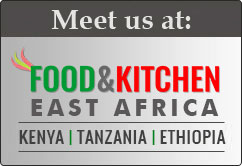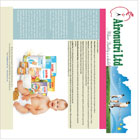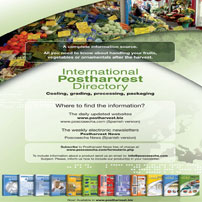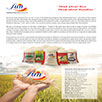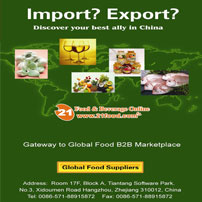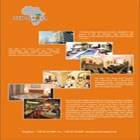

M a r k e t N e w s
Ethiopia: Biotechnology Can Improve Agricultural Productivity - COMESA Advisor
Posted on : Wednesday , 22nd March 2017
Agriculture is the mainstay of our economy as 80 per cent of the population earns its living directly from it. It supplies food to local market and also serve as a means of hard currency earning. However, as a rain-fed one, it is highly vulnerable to extreme weather conditions such as drought and flood. Moreover, the prevalence of pests and herbs highly compromise the amount of yield.
For many decades in order to improve productivity researches have been made in conventional methods and improved seeds which can resist drought, pests and herbs have been hybridized and rising productivity was achieved. Nevertheless, the current global warming and climate change and the dwindling of water sources further aggravates the challenges of agriculture. In addition, in such situation, feeding the ever growing population has made the matter worse. Hence to mitigate the problem uninterrupted scientific researches are essential. By now many countries have resorted to the application of biotechnology and could achieve tremendous result in improving agriculture productivity.
Dr. Getachew Belay is working as a biotechnology adviser in the Common Market for Eastern and Southern Africa COMESA. As to him, biotechnology can serve as a positive catalyst of productivity in various sectors such as agriculture, industry, medicine and pharmaceutical. It also helps in protecting the environment. The biotechnology products have been supplied in the world market since 1996 GC and their acceptance is growing all over the world from time to time. As mentioned above, in order to overcome the rising of food price and to feed the growing population, countries resorted to plant transgenic seeds and could withstood the problems with regard to food deficit.
The major crops that have been growing in the transgenic form are cotton, maize, cassava and soya bean. Currently all over the world transgenic crops are growing on 188 million hectare of land and 15 million people are engaged in such practice. The world most populous countries such as China and India are known to grow transgenic plants. This way they have succeeded in achieving food security and in meeting their agro-industry demand such as cotton. By now both countries have become the major cotton exporters in the world. According to Getachew, in Africa countries such as Burkina Faso, Egypt and Sudan are known for producing BT cotton (Bacillus thuringiensis).They have enhanced their cotton production and in addition to meeting their local demands, they have become the net exporter of cotton. Before they resorted to the BT cotton production. These countries used to pursue a conventional farming method. But their productivity was insufficient because the traditional cotton seed was eaten by African ball-worm.
Protecting the crop from the pest through the spread of insecticide was not fruitful. Rather the insecticide was harmful to the environment. Now BT cotton has become the best option in enhancing cotton productivity. By its nature, BT cotton has the capacity to eat the African ball-worm so that there is no need to spread pesticide on BT cotton. Asked weather the utilization of transgenic plants on agriculture has its own demerit on the environment Getachew said that, there is biosafety laws that countries are required to abide by and most countries including Ethiopia are signatories to the protocol. So far, the utilization of transgenic plants did not brought (bring) any repercussion on the environment and on the biodiversity at large. As to Getachew, had it been harmful to the environment India and China would never have practised transgenic plants.
According to Dr. Endale Gebre, the Director of the the biotechnology department in the Ethiopian Agricultural Research Institute, improving agricultural productivity in Ethiopia is a long time effort and to do the task, decades back, agricultural research institutions were established.
Currently more than 15 institutions are engaged in biotechnology research and some outputs of the researches have been disseminated to pertinent bodies. In addition to these, research institutions in many universities have opened biotechnology departments and thousands of students graduate annually from these universities. Currently, the Debrezeit, Jimma and Melkasa agricultural research institutions are engaged in plant and animal research.
They supply their hybridized outputs to farmers and contribute for the enhancement of productivity. Among others, the institutions mainly engage in tissue culture, molecular and microbial biotechnology researches. In its GTP II road map the government eyes at the expansion of textile industries, which need more cotton production. Currently, the nation could not satisfy its cotton demand from local market.
Hence, it spends a significant amount of hard currency for cotton importation from abroad. Thus, unless the importation of cotton is substituted the outflow of hard currency further affects the currency reserve of the nation. Therefore, producing better cotton which can be used as an input for the textile industries should be taken as option. Similar to the other countries, the traditional cotton, which is growing here, is highly vulnerable to African ball worm and the yield is insignificant to meet the demand. Taking the problem into consideration, the government is embracing the experimentation of BT cotton in seven agro-ecological zones.
The owner of the project is the Ethiopian Agricultural Research Institute (EARI). Ato Belete Geda is a lawyer at the Ministry of Forest, Environment and Climate Change. As to him, in order to tap the fruit of the biotechnology, Ethiopia relaxed the previous biosafety law in 2015 and after that interested groups have signed agreement with the ministry to import gene and to make research on plant genes. And currently, based on the agreement to improve the cotton production, the Ethiopian Agricultural Research Institute is experimenting BT cotton for the last one year. The result will be publicized soon.
According to Belete, other research institutions have also made agreement with the Ministry to conduct research with false banana by applying transgenic method. And in any process the biosafety law of the nation is never compromised. Through the new technology some of the sector's basic problems will be resolved.
Source : allafrica.com


